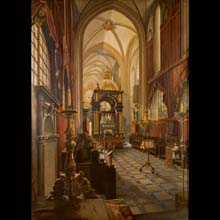
material: oil on canvas
dimensions: 157 x 116 cm
description: Saturnin Świerzyński painted works depicting towns, historical sites and landscapes of special significance for national culture and history, known as “intimate places.” The Wawel hill always held a special place among them. The cathedral, situated there, housing national memorabilia and the ashes of kings, commanders and heroes was the place where the Polish people could cherish memories of the independent homeland. Painted with great precision and rendered in dark colours, in terms of style the painting is reminiscent of the art of Marcin Zaleski and 17th-century Dutch painters. It depicts the Gothic interior of the cathedral, baroquized between the 17th and 18th centuries. The sunlight, coming in through pointed windows, highlights the contrasts of light and shade, enhancing the atmosphere of solemnity and tranquillity. Świerzyński painted the view over the shrine-mausoleum of Saint Stanisław – the ideological centre of the cathedral known as the “Altar of the Fatherland,” shown from the corner of the chancel. The mausoleum, holding the remains of one of the patron saints of Poland, was built in 1626–1629 after the design by Giovanni Trevano. It became the place of national and religious cult in the 19th century. At that time it was believed that Poland, divided between the partitioning powers, would unite like the body of Saint Stanisław which, chopped to pieces by the torturers, miraculously became one again. Aleksandra Krypczyk
exposition: The Gallery of 19th Century Polish Art in Sukiennice,
The Cloth Hall, 1, Main Market Square
key: Romanticism. Towards national art >>>
dimensions: 157 x 116 cm
description: Saturnin Świerzyński painted works depicting towns, historical sites and landscapes of special significance for national culture and history, known as “intimate places.” The Wawel hill always held a special place among them. The cathedral, situated there, housing national memorabilia and the ashes of kings, commanders and heroes was the place where the Polish people could cherish memories of the independent homeland. Painted with great precision and rendered in dark colours, in terms of style the painting is reminiscent of the art of Marcin Zaleski and 17th-century Dutch painters. It depicts the Gothic interior of the cathedral, baroquized between the 17th and 18th centuries. The sunlight, coming in through pointed windows, highlights the contrasts of light and shade, enhancing the atmosphere of solemnity and tranquillity. Świerzyński painted the view over the shrine-mausoleum of Saint Stanisław – the ideological centre of the cathedral known as the “Altar of the Fatherland,” shown from the corner of the chancel. The mausoleum, holding the remains of one of the patron saints of Poland, was built in 1626–1629 after the design by Giovanni Trevano. It became the place of national and religious cult in the 19th century. At that time it was believed that Poland, divided between the partitioning powers, would unite like the body of Saint Stanisław which, chopped to pieces by the torturers, miraculously became one again. Aleksandra Krypczyk
exposition: The Gallery of 19th Century Polish Art in Sukiennice,
The Cloth Hall, 1, Main Market Square
key: Romanticism. Towards national art >>>












